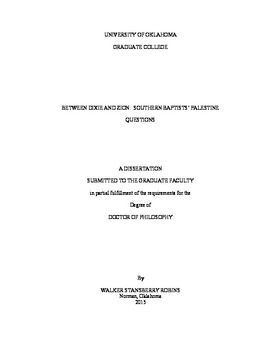| dc.description.abstract | Today, evangelical Christians are the largest pro-Israel constituency in a United States population that is very supportive of the Jewish state generally, with evangelicalism and Christian Zionism often understood as inexorably intertwined. However, such political support for Israel was not an inevitable product of evangelicalism. It emerged, rather, out of a variety of evangelical encounters with the land, the peoples, and the politics of Palestine and Israel. Between Dixie and Zion: Southern Baptists’ Palestine Questions explores the evangelical encounter with Palestine during what is known as the Mandate Era through a focus on the Southern Baptist Convention (SBC), the largest Protestant denomination in the United States. Between the defeat of the Ottomans in World War I and the creation of Israel in 1948, Britain governed Palestine through a League of Nations Mandate that called upon the British to prepare Palestine for eventual self-government. What this self-government would look like—whether it would favor the Zionist movement or the Palestinian Arabs—was a matter of public debate referred to as “the Palestine question.” While many Southern Baptists were interested in the Holy Land, most avoided engaging this political question, instead forming their own “Palestine questions” determined by how they encountered the region. Foreign missionaries raised different questions than editorialists, travel writers than Arabs, Jewish converts than the President of the United States. Across this diversity of encounters and questions, however, commonalities emerged. Southern Baptists overwhelmingly identified the Zionist movement with civilization, modernity, and progress against the Arabs, whom they viewed as quaint or backward. Even as
Baptists generally avoided or disagreed over the politics of Zionism, influential individuals—the SBC’s lone missionary to the Jews, the mission study editor of the Woman’s Missionary Union, and the fundamentalist rebel, J. Frank Norris— preached that the movement was a fulfillment of biblical prophecy. What mattered most, however, in shaping Baptist attitudes towards Palestine were the actual developments on the ground in the region—and what remained Southern Baptists’ ultimate answer to every Palestine question was Christ. | en_US |
